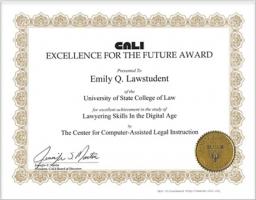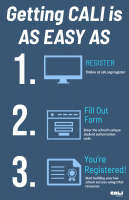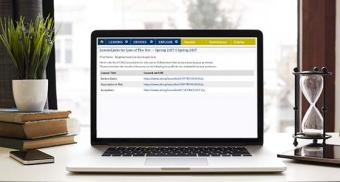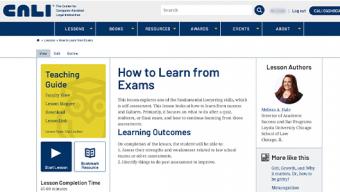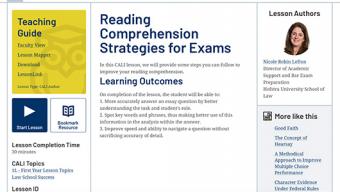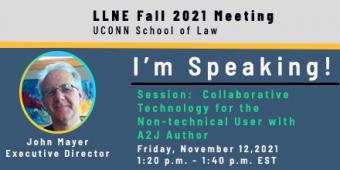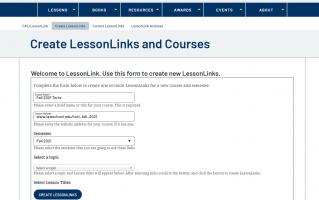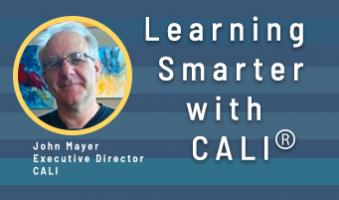If you teach in a US law school, you should be looking at CALI Lessons and assigning them to your students.
-1- CALI Lessons are another way to learn the law
CALI Lessons are another way to learn the law. They are interactive web-based tutorials that both teach and exercise the students’ understanding of what they just read. Students learn from their casebook readings, classroom, and supplements. Many commercial supplements are not written by law faculty and are simplified and watered-down versions of the law. CALI Lessons are not. CALI Lessons present hypothetical situations and then quiz the students on their understanding using follow-up questions and branching to make sure they got the right answer for the right reasons.
-2- CALI Lessons are formative assessments for your students
Students want to know that they are understanding what they study. The only way to be sure is to assess and CALI l Lessons provide a form of self-assessment for students. They get feedback on every question - whether they get it right or wrong - and they get a final score that tells them how they are doing on a specific legal topic. Using CALI’s LessonLink service, law faculty can create unique links to CALI Lessons that allow them to view student scores. This gives faculty feedback on how well their students are following their teaching.
-3- CALI Lessons are interactive and engaging
CALI Lessons are not videos that students passively watch. The material is modeled on Socratic Dialogue where a question is asked, the student answers, and then various aspects of the topic are explored. CALI Lessons are written by tenured law faculty with many years of teaching experience (law librarians author the legal research lessons). The lessons purposefully steer students into thinking about the topic in a nuanced way.
-4- CALI Lessons are rigorous
It is difficult to get a perfect score on most CALI Lessons the first time through. Law is complex and CALI Lessons dive into that complexity. Each lesson covers a specific topic without getting too broad in scope. The questions are tough and require serious thought from the student. A typical lesson takes 20 to 40 minutes for a student to complete and the student gets a score with a certificate of completion at the end of the lesson. Students can run the lessons multiple times to improve their understanding.
-5- CALI Lessons are authored by your colleagues and reviewed three separate times - by internal staff, by non-anonymous peer review, and anonymously by the CALI Editorial Board
CALI Lessons are written by tenured law faculty who have taught the subject multiple times. Our model for authoring is to invite five faculty to form a Fellowship. First, we train them in our authoring software and they meet to determine the most significant topics in a course. Only then do they decide who will write which lessons. Fellows are required to write five lessons, so a typical Fellowship will yield 25 new CALI Lessons in 8-12 months. Fellows meet in person three times to discuss and review each other’s lesson - it’s a collaborative effort such that the quality of the lesson benefits from five experienced faculty. Next, the lessons are reviewed, anonymously, by law faculty on the CALI Editorial Board. These are faculty CALI pays to do reviews and many are authors of CALI Lessons themselves, so they understand the medium. Finally, when we publish the lessons, we get feedback from faculty and students which we use to make improvements. Every year, we go back to our authors and ask if there is a need for revisions due to changes in the law. We pay authors for extensive revisions. CALI Lessons are some of the most extensively vetted and reviewed educational materials available in legal education today.
-6- CALI Lessons are short and respect the attention span of modern thinking about content design
Today’s students are born digital and research shows that it is better to ‘chunk’ material to provide natural breaks while studying. CALI Lessons are designed this way so that faculty can assign only the material they want to assign and students only study the material they need. CALI Lessons are designed to take between 20 and 40 minutes for the student to complete and because of the interactive nature, they reward repeated runs.
-7- CALI Lessons are a good learning appetizer or an excellent learning dessert
CALI Lessons are an excellent learning experience when assigned as a first bite at the material. They prepare the student for class or subsequent readings. The material is pithy and rigorous; students are exposed to the concepts and nomenclature of the topic without being drilled and practiced to death. In addition, CALI Lessons are excellent for studying after class (alone or in a study group), after the casebook readings, or for studying for the final exam. They provide immediate and substantive feedback that can direct the student to the places where further study is required.
-8- CALI Lessons are great for covering material you can’t fit into your syllabus
There aren’t enough classroom hours to cover everything. You can assign CALI Lessons that cover topics that you don’t have time to cover in class. If you have snow days or must cancel a class to attend a conference, you can assign CALI Lessons and if you use LessonLink, you can see how well your students did.
These are some of our reasons for using CALI Lessons in your teaching. We want our materials to be useful, relevant, and up to date and we work very hard towards those goals. CALI publishes over 1200 lessons covering 40 different legal subject areas. These lessons have been used over 10 million times by law students over the years. Take a look at CALI Lessons for your teaching. If you would like someone from CALI to come out to your law school and give a lunch talk to the faculty, drop me a note. The most common comment I hear when I do these talks is “I didn’t know you did that.” We are always looking to innovate and improve. If you have comments, ideas, suggestions, or complaints, do not hesitate to contact me at jmayer@cali.org. I am listening.
John Mayer
Executive Director
Center for Computer-Assisted Legal Instruction (CALI)
jmayer@cali.org
@johnpmayer - twitter
@caliorg - CALI on twitter
